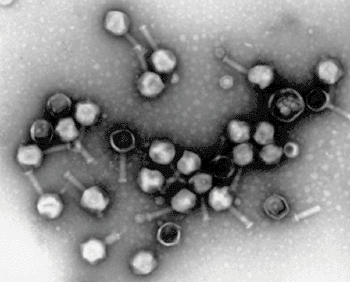Inexpensive Urine Test Detects Prostate Cancer
By LabMedica International staff writers
Posted on 03 Jun 2013
An inexpensive, accurate way to detect prostate cancer could facilitate commercially available, at-home or point-of-care urine tests.Posted on 03 Jun 2013
The sensitive detection of cancer biomarkers in urine could revolutionize cancer diagnosis and treatment, but such detectors must be low-cost, easy to interpret, and sensitive.

Image: Electron micrograph of particles of a virus (Photo courtesy of the University of Leeds).
Chemists at the University of California (Irvine, CA, USA) have created a way to clearly identify clinically usable markers for prostate cancer in urine, meaning that the disease could be detected far sooner, with greater accuracy and at dramatically lower cost. The same technology could potentially be used for bladder and multiple myeloma cancers, which also shed identifiable markers in urine.
Salt in urine helps conduct electricity but also makes it challenging for typical biosensors to differentiate the signals of cancer molecules from the background noise around them in the electrodes. The team developed a new type of sensor by adding nanoscale protein receptors to tiny, pencil-like viruses called bacteriophages (phages) that live only within bacteria. Double wrapping the phages with additional receptors greatly increases the capture and transmission of cancer molecule signals.
The chemists constructed a bioaffinity matrix of viruses integrated into Poly(3,4-ethylenedioxythiophene) (PEDOT) films for electrochemical sensing of a prostate cancer biomarker called prostate-specific membrane antigen (PSMA). High sensitivity to PSMA resulted from synergistic action by two different ligands to PSMA on the same phage particle. One ligand was genetically encoded, and the secondary recognition ligand was chemically synthesized to wrap around the phage. The team were able to detect subnanomolar quantities of PSMA in synthetic urine solution by using the synergistic, dual-ligand phage.
Reginald M. Penner, PhD, a professor of chemistry and the study's corresponding author, said, “Our goal is a device the size of a home pregnancy test priced around USD 10. You would buy it at the drugstore or the grocery store and test yourself. We're on the verge of a very important breakthrough in a new era of personal health management. The manufacturing costs would be low, because the material costs are very, very low. The receptors for recognizing the cancer markers are really inexpensive to make. That's why we chose these viruses. The receptors are also incredibly tough. They don't need to be refrigerated and can withstand nearly boiling temperatures, meaning the portable tests could be used in myriad weather conditions and storage situations." The study was published on April 24, 2013, in the Journal of the American Chemical Society.
Related Links:
University of California













